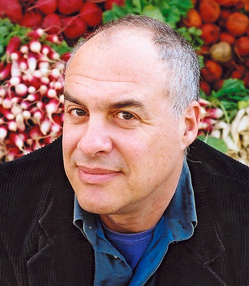It’s not only activists and advocates who are influencing the dialogue. Anyone who purchases food – which is to say everyone – has the opportunity to advance the changes advocated in Food Matters. I’ve come to call this "personal food policy,” because collectively our choices can stand up to the legislators, lobbyists, and special interest groups that continue to shape the way our food is raised, produced, packaged, shipped, and marketed.
- Mark Bittman, The Food Matters Cookbook
Eat More Plants, Less of Everything Else
As someone who spends an inordinate amount of time reading about, talking about, cooking, and eating food, getting to hear New York Times food writer Mark Bittman speak twice in 24 hours was kind of like being a 12 year-old girl who gets to hold hands with Justin Bieber at homecoming. I was very excited, in other words.
 Mark BittmanBittman, author of How to Cook Everything, Food Matters, and the new Food Matters Cookbook, was in town for The Food for Thought – Healthy Foods Summit hosted by the University of Minnesota’s Healthy Foods, Healthy Lives Institute and the Minnesota Landscape Arboretum last week.
Mark BittmanBittman, author of How to Cook Everything, Food Matters, and the new Food Matters Cookbook, was in town for The Food for Thought – Healthy Foods Summit hosted by the University of Minnesota’s Healthy Foods, Healthy Lives Institute and the Minnesota Landscape Arboretum last week.
Bittman, as dry and witty in real life as he is on TV, started his Thursday evening talk by promising to share some of his food fears, predictions, hopes, and dreams, and to challenge each of us to make individual changes of our own. Bittman recognized that he was preaching to the choir, but he came to Minnesota to preach and that's just what he did. Here are a few selections from his sermon.
The Bittman Bell Curve of Bad Habits
Bittman shared research and statistics to illustrate the effects the current American lifestyle has on our individual health and the health of our environment. The most compelling illustration, the aptly-named “Bittman Bell Curve of Bad Habits,” compared the American lifestyle to the diets of other countries. While other countries focus on bikes and broccoli, in the US we tend to focus on SUVs and Meat. We can no longer sustain the American diet, Bittman said -- the under-consumption of under-processed plants and the over-consumption of commercially produced meats and processed foods.
Sane Eating is Sustainable
If the word "sustainable" is defined -- as Bittman suggested -- as the capacity to endure, then our current system is not sustainable: neither our personal health nor our environment can endure the current American lifestyle and diet. “No one was born craving whoppers, skittles and donuts,” Bittman said, reminding us that 100 years ago, everyone was a locavore. Every household had a cook -- generally Mom -- and everyone ate real food.
To solve the problem, Bittman preached the gospel of “Less-meatatarianism” or "sane eating," changing the proportion of what we eat to rely more heavily on plants, with animal products as the side dish. Bittman visualizes a seesaw, with the meat on one side and the veggies on the other. Too often, the meat side is weighed down; Bittman challenged us to make sure the veggie side is heavier.
According to Bittman, a diet that gets 70% of its calories from plants is ideal, and he has long been a proponent of eating only whole grains, beans, vegetables, fruits, and nuts until 6:00 pm each day (in the evening he eats whatever the heck he wants). Bittman recognized that this might not work for everyone, and he challenged each of us to define -- and stick to -- our own individual food policy.
Soda Tax
Like many great men and women, Mark Bittman has a dream. It's a simple dream, in which a penny tax gets added to every soda purchased in this country, and the enormous revenue stream it generates supports the creation of good food solutions for everyone, like better school lunches and culinary education for people who live in food deserts. The tax might even decrease consumption and lower healthcare costs. (We wrote extensively about the soda tax yesterday, check it out.)
Food for Thought: Reports from the Road
Friday morning's talk focused more on how to change our lifestyles. Bittman’s opening statement, “we all think we’re here working, and I'm the only one standing up," was meant to remind us that if we're not farmers, we don't need to eat like farmers. (We can eat like people who sit in cubes, or write blogs at home, or whatever it is that we actually do.) Bittman also stressed that if we want to change our lifestyles we need to plan accordingly and be disciplined in order to be successful.
My Personal Food Policy
I like to think I'm pretty far along in my personal food policy, with a strong focus on seasonal, local, and sustainably produced foods, including lots of fruit and vegetables. But I also love eating meat, and eat it often. Still, two servings of Bittman last week inspired me to think about my seesaw and tweak it a bit. I think I’ll start with meatless Mondays. Who's with me?
Tomato photo above by Kate NG Sommers.

Kristi Hamilton is the owner of Twin Cities-based En Root Marketing & Communications, focused on mission-driven organizations. A real food enthusiast, she volunteers for Prairie Oaks Institute, Tour de Farm, and Real Food Minnesota. Follow her on Twitter @enroot.




